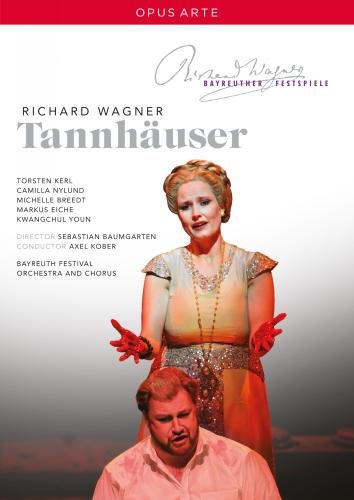WAGNER Tannhäuser
View record and artist detailsRecord and Artist Details
Composer or Director: Richard Wagner
Genre:
Opera
Label: Opus Arte
Magazine Review Date: 09/2015
Media Format: Digital Versatile Disc
Media Runtime: 252
Mastering:
DDD
Catalogue Number: OA1177D

Tracks:
| Composition | Artist Credit |
|---|---|
| Tannhäuser |
Richard Wagner, Composer
Axel Kober, Conductor Bayreuth Festival Chorus Bayreuth Festival Orchestra Camilla Nylund, Elisabeth, Soprano Katja Stuber, A Young Shepherd, Soprano Kwangchul Youn, Hermann, Bass Lothar Odinius, Walther, Tenor Markus Eiche, Wolfram, Baritone Michelle Breedt, Venus, Mezzo soprano Rainer Zaun, Reinmar, Bass-baritone Richard Wagner, Composer Stefan Heibach, Heinrich, Tenor Thomas Jesatko, Biterolf, Bass-baritone Torsten Kerl, Tannhäuser, Tenor |
Author: Mike Ashman
Tannhäuser, not the easiest opera in the repertoire to cast, is handsomely sung here. Following in the footsteps of the role’s creator Josef Tichatschek, Torsten Kerl puts his Rienzi experience to good use as the frustrated minstrel, ending with a suitably tortured reading of the Rome Marration. His women are powerful – only the very end of Venus’s part is a little high for Michelle Breedt – and (for once) powerfully contrasted. Camilla Nylund’s Elisabeth has a range of novel emotions to convey, including humour and sexual interest. The fellow Wartburg minstrels, especially Markus Eiche’s Wolfram, are pretty ideal. And we mustn’t forget Katja Stuber’s drunken Shepherd, here given so much more to act than normal.
Question marks begin with the staging. The opera is all set on an installation by Dutch artist Joep van Lieshout representing an eco-factory recycling human waste into food and (mostly, it appears) drink. It is maintained (and over-frequently polished) by the citizens of the Wartburg, a Zauberflöte-like working community whose Sarastro is a decidedly fierce Landgraf. Their actions – which include a sung Eucharist before Act 3 (booed on this occasion!) – are visible throughout the intervals.
Up from the middle of the floor comes a large circular cage in which hippie-like primitives and dancing sperms (yes, really) enact a faded Bacchic sexual ritual. The geography is kind of fine; the relevance of the eco-plant (whatever Wagner’s occasionally vegetarian beliefs) and its control, or not, of its citizens escapes me. Act 2 – where at last someone has fun with the pretensions and ceremony of the singing contest – has its moments, but too much of the outer acts presents a conventional production in 21st-century clothes struggling with the factory environment. The final image, as the chorus pass round and celebrate Venus’s newly born baby (don’t ask) and Elisabeth returns from the gas oven (ditto) to be hymned by all, is one of over-imaginative confusion.
Discover the world's largest classical music catalogue with Presto Music.

Gramophone Digital Club
- Digital Edition
- Digital Archive
- Reviews Database
- Full website access
From £8.75 / month
Subscribe
Gramophone Full Club
- Print Edition
- Digital Edition
- Digital Archive
- Reviews Database
- Full website access
From £11.00 / month
Subscribe
If you are a library, university or other organisation that would be interested in an institutional subscription to Gramophone please click here for further information.




